|
|
|
Sort Order |
|
|
|
Items / Page
|
|
|
|
|
|
|
| Srl | Item |
| 1 |
ID:
165593
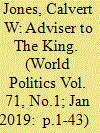

|
|
|
|
|
| Summary/Abstract |
Do experts rationalize and legitimize authoritarian governance? Although research on expert actors in contexts of democracy and international governance is now extensive, scholarly work on their role in authoritarian settings remains limited. This article helps open the black box of authoritarian decision-making by investigating expert advisers in the Arab Gulf monarchies, where ruling elites have enlisted them from top universities and global consulting firms. Qualitative fieldwork combined with three experiments casts doubt on both the rationalization and legitimacy hypotheses and also generates new insights surrounding unintended consequences. On rationalization, the evidence suggests that experts contribute to perverse cycles of overconfidence among authoritarian ruling elites, thereby enabling a belief in state-building shortcuts. On legitimacy, the experiments demonstrate a backfire effect, with experts reducing public support for reform. The author makes theoretical contributions by suggesting important and heretofore unrecognized conflicts and trade-offs across experts’ potential for rationalizing vis-à-vis legitimizing.
|
|
|
|
|
|
|
|
|
|
|
|
|
|
|
|
| 2 |
ID:
193484
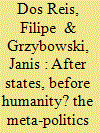

|
|
|
|
|
| Summary/Abstract |
In the debate on the (de-)judicialisation of international affairs and the International Criminal Court (ICC) specifically, the distinctions between legality and politics and between state sovereignty and the international remain contested. While realist and legalist approaches discuss the transformation of international politics by international criminal law, sociological and critical-legal perspectives instead highlight the politics of international criminal law. In this contribution, we focus on how the distinctions between (international) law and politics matter, not as substantively opposed spheres, but as boundaries that the ICC itself contingently and flexibly draws when considering particular situations. These meta-politics of invoking and reproducing key boundaries in seemingly technical elaborations of the interest of justice, the scope of its jurisdiction, or the application of complementarity reflect the Court’s particular authority but also its predicament of pushing for an international criminal law serving humanity, rather than states, while reproducing the distinctions between (international) law and politics. We illustrate the Court’s meta-politics by revisiting three recent decisions of the ICC to (not) investigate alleged international crimes committed by British forces in Iraq, by the Taliban, governmental, and US forces in Afghanistan, and by Israeli authorities and Palestinian groups in the West Bank, East Jerusalem, and Gaza.
|
|
|
|
|
|
|
|
|
|
|
|
|
|
|
|
| 3 |
ID:
189466
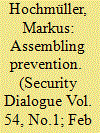

|
|
|
|
|
| Summary/Abstract |
This article examines the technopolitics of prevention in postwar Guatemala. In the 2010s, experts and policymakers shifted security governance in Central America’s most populous country towards anticipation. Against the background of rising gang violence, they implemented a set of sociopolitical and techno-material measures – based on the latest crime-control technologies, new policing strategies and urban design methods – in Guatemala’s most violent municipalities. The stated goals were to reconstruct state sovereignty and to improve public security by strengthening community resilience and inducing positive behavioural change in ‘at-risk’ citizens. Zooming in on the case of Villa Nueva, the article examines the emergence and effects of Guatemala’s ‘prevention assemblage’. It demonstrates that this technopolitical project has failed, as prevention turned into a new layer of control that shifted responsibility to local communities, further securitized urban spaces and populations, and reproduced exclusionary and repressive security governance.
|
|
|
|
|
|
|
|
|
|
|
|
|
|
|
|
| 4 |
ID:
193962


|
|
|
|
|
| Summary/Abstract |
The Council of Europe’s Budapest Convention on cybercrime (2001) remains a key landmark in multilateral governance on cybersecurity. Negotiated over two decades ago, this regional agreement gains renewed significance today through its enduring impact, its rarity as a binding multilateral agreement on cyber-issues, and its role in shaping the debate on free speech and the criminalization of online content. This article asks how the almost-total exclusion of content crimes from the Convention can be explained. Drawing on new documents published for the twentieth anniversary of the Convention, including detailed testimonials from its chair and principal drafters, the article highlights the importance of long-term career connections among technically-savvy and diplomatically experienced negotiators, creating a transnational policy network that overcame differences and power imbalances. Understanding how the Budapest Convention resolved disagreements helps contextualize current crises in multilateral cybersecurity and cybercrime governance and provides a path away from growing digital authoritarianism.
|
|
|
|
|
|
|
|
|
|
|
|
|
|
|
|
| 5 |
ID:
194775


|
|
|
|
|
| Summary/Abstract |
The period of Donald Trump’s term in office was one of the most contentious periods of American civil–military relations. Both active-duty and retired officers rebuffed and castigated the president’s actions, policies, and character. Such public criticism of a sitting president has no real parallel in American history. This breakdown in civil–military relations was caused by the president’s lack of respect and in fact disdain for the contours of military professionalism. Those contours are expressed by the attributes of expertise, corporateness, and responsibility. The military’s notion of commitment to the Constitution, an apolitical ethos, as well as its willingness to sacrifice for the national good were all part of the military’s own sense of professional values. In this case, the sitting president shared none of those values and tried to politicize the military, ignored their expertise, and disparaged their selfless sacrifice.
|
|
|
|
|
|
|
|
|
|
|
|
|
|
|
|
| 6 |
ID:
197121


|
|
|
|
|
| Summary/Abstract |
Artificial intelligence (AI) technologies pervade myriad decision systems, mobilising data at a scale, speed, and scope that far exceed human capacities. Although it may be tempting to displace humans with these automated decision systems, doing so in high-stakes settings would be a mistake. Anchored by the example of states’ resort to force, I argue that human expertise should be elevated—not relegated—within high-stakes decision contexts that incorporate AI tools. This argument builds from an empirical reality in which defence institutions increasingly rely on and invest in AI capabilities, an active debate about how (and if) humans should figure into automated decision loops, and a socio-technical landscape marked by both promise and peril. The argument proceeds through a primary claim about the amplified relevance of expert humans in light of AI, underpinned by the assumed risks of omitting human experts, together motivating a tripartite call to action. The position presented herein speaks directly to the military domain, but also generalises to a broader worldbuilding project that preserves humanism amidst suffusive AI.
|
|
|
|
|
|
|
|
|
|
|
|
|
|
|
|
| 7 |
ID:
161546
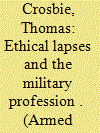

|
|
|
|
|
| Summary/Abstract |
In a recent issue of this journal, we published an article titled “Fault Lines of the American Military Profession”. Donald S. Travis subsequently wrote a Dipustatio Sine Fine rejoinder that raised a number of criticisms of our piece and suggested several ways forward. For our part, we detect three serious problems in Travis’s analysis and offer a single syncretic response. Our solution builds on the insights of Travis’s critique while avoiding the pitfalls of his specific line of reasoning. We conclude by urging others to continue to debate and research these very consequential and timely issues.
|
|
|
|
|
|
|
|
|
|
|
|
|
|
|
|
| 8 |
ID:
190220
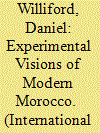

|
|
|
|
|
| Summary/Abstract |
This article examines the work and trajectory of ʿAbd al-Salam al-Diyuri, a Moroccan engineer educated in Egypt who became a nationalist writer, editor, and publisher during the last decade of the French Protectorate (1912–56). One of only a few Moroccan engineers trained in Arabic during this period, al-Diyuri developed a vision of modernization rooted in the popularization of technical knowledge that distinguished him from colonial engineers as well as nationalist elites. French experts exercised an epistemic dominance over the practice of engineering under the protectorate as well as after Morocco's independence. In this context, al-Diyuri's arguments traced the contours of an alternative future for the country—one that tied decolonization to the cultivation of technical competencies among the public at large. This article follows the path of a nationalist engineer and intellectual whose work both embodied and attempted to move beyond a contradiction between the democratization of knowledge and the demands of development.
|
|
|
|
|
|
|
|
|
|
|
|
|
|
|
|
| 9 |
ID:
160628
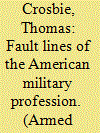

|
|
|
|
|
| Summary/Abstract |
Over the past decade, the American armed services have witnessed a near-constant stream of so-called ethical lapses. Spanning rank, specialty, and service, these “lapses” have given rise to a flood of criticism by journalists and piercing calls for reform from politicians. In response, American military leaders have pointed to the paired concepts of profession and professionalism as the solution. In this article, we use classical conceptualizations of the military profession to resituate the problem of ethical lapses as instead one of the three fault lines of the contemporary American military profession, unfolding alongside crises in military expertise and identity. The three fault lines reveal at once the large scale of the challenges facing the American armed services and our very limited social scientific understanding of those problems. We end by emphasizing the need for future research to establish an updated empirical baseline for theories of the military profession in America.
|
|
|
|
|
|
|
|
|
|
|
|
|
|
|
|
| 10 |
ID:
193616
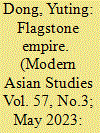

|
|
|
|
|
| Summary/Abstract |
This article investigates Japanese imperialism in northeast China through its road construction infrastructure projects within its railway auxiliary zone (1906–1932) and Manchuria at large (1932–1945). The materiality of roads unveils a history of how Japanese engineers adapted to local practices and absorbed local knowledge in building physical infrastructure and developing their technical expertise. These engineers engaged with local practices rooted in pre-existing social and natural environments to facilitate road construction. At the same time, in Manchuria their technical expertise in construction was built on the absorption and subsequent erasure of local workers’ vernacular craft. Rather than the physical realization of an imperialist, top-down vision of modernization, imperial infrastructure projects were in fact hybrid productions of technical expertise, and local vernacular knowledge and skills. By constructing roads, engineers helped to expand Japan’s political and economic influence in northeast China, assert domination over Chinese residential areas and business interests, and coerce Chinese subjects into complying with policies and rules issued by Japanese administrations. The materials of roads—gravel, granite flagstone, and concrete—illustrate a complex relationship between Japanese imperial agents and local environments.
|
|
|
|
|
|
|
|
|
|
|
|
|
|
|
|
| 11 |
ID:
093993
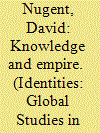

|
|
|
|
|
| Publication |
2010.
|
| Summary/Abstract |
This paper focuses on the relationship between the social sciences in the U.S. and the formation of empire. I argue that the peculiar way the U.S. has established a global presence during the 20th century-by establishing a commercial empire rather than territorially-based colonies-has generated on the part of state and corporation an unusual interest in the knowledge produced by social scientists. It has also generated an unusual willingness on their part to subsidize the production of that knowledge. Not only have government and corporation considered the social sciences essential to the project of managing empire. At each major stage in the reorganization of that empire state and capital have underwritten a massive reorganization in the production of social science knowledge.
|
|
|
|
|
|
|
|
|
|
|
|
|
|
|
|
| 12 |
ID:
190700
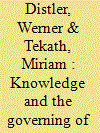

|
|
|
|
|
| Summary/Abstract |
While studies on the role of knowledge and expertise have seen a resurgence of interest in International Relations and in literature on peacebuilding and security governance, little is known how knowledge enters the governance routines after the initial establishment of peacebuilding operations. Taking the mandate decision-making process of MINUSMA and EUTM operations in Mali in the German parliament as case for our explorative study, we ask how knowledge has entered the parliamentary process and how various epistemic practices and epistemic agency shape this peacebuilding governance since 2013. Informed by an object-centred knowledge framework, we argue that the practices and types of agency involved mostly ‘lock-in’ the governing of robust peacebuilding in Mali in much broader foreign- and security policies routines. Epistemic practices are not primarily concerned with new impulses or critical analysis, but with rendering Mali governable as interventionary object. The epistemic authority of the government is dominant and we do not find much evidence that hegemonic knowledge is challenged. Intervening agents do extract certain knowledge via transnational channels from Mali, however, broader knowledge debates or the involvement of Malian agents are missing.
|
|
|
|
|
|
|
|
|
|
|
|
|
|
|
|
| 13 |
ID:
178691
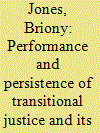

|
|
|
|
|
| Summary/Abstract |
Transitional justice, like other peacebuilding endeavours, strives to create change in the world and to produce knowledge that is useful. However, the politics of how this knowledge is produced, shared and rendered legitimate depends upon the relationships between different epistemic communities, the way in which transitional justice has developed as a field and the myriad contexts in which it is embedded at local, national and international levels. In particular, forms of ‘expert’ knowledge tend to be legal, foreign and based on models to be replicated elsewhere. Work on epistemic communities of peacebuilding can be usefully brought to bear on transitional justice, speaking to current debates in the literature on positionality, justice from below, marginalisation and knowledge imperialism. This article offers two contributions to the field of transitional justice: (1) an analysis of the way the field has developed as an epistemic community(ies) and the relevance of this for a politics of knowledge; and (2) an argument for the politics of knowledge to be more widely discussed and understood as a factor in shaping transitional justice policy and practice, and as a call to a more ethical relationship with the supposed beneficiaries of transitional justice interventions.
|
|
|
|
|
|
|
|
|
|
|
|
|
|
|
|
| 14 |
ID:
163880
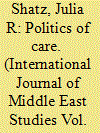

|
|
|
|
|
| Summary/Abstract |
This article examines the work experiences of Palestinian Arab nurses to illuminate the operation of the colonial public health regime in Mandate Palestine. Analyzing nurses’ work in the clinics of town and village communities and their relationships with the colonial government's Department of Health, it argues that these nurses were social and political interlocutors in the system of public health, which depended upon their intimate relationships with local communities. By pulling these women out of the archives, this article complicates received wisdom among scholars about development, expertise, and the chronology of welfare. Telling the stories of these women also provides a ground-level view of the operation of daily governance in Mandate Palestine and the lived social, political, and economic realities of an often-overlooked cadre of Palestinian workers from that period.
|
|
|
|
|
|
|
|
|
|
|
|
|
|
|
|
| 15 |
ID:
171790
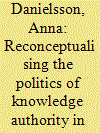

|
|
|
|
|
| Summary/Abstract |
Peacebuilding debates increasingly revolve around questions about knowledge and expertise. Of particular interest is what (and whose) knowledge(s) ends up authoritative in interventions. This article addresses a problem in the literature on the epistemics and epistemic authority of peacebuilding interventions: the acknowledgement of but lacking attention to plural knowledges, the transgressive character of expertise, and knowledge struggles. It does this by discussing recent suggestions that peacebuilding epistemic authority can be fruitfully analysed as a Bourdieusian field. The article identifies a tension in Bourdieu's own thinking about fields, which has shaped some of these recent proposals. This tension, nevertheless, also enables a reconsideration of fields and struggles, and thereby an analysis that takes plurality and transgressiveness into account. By developing such an alternative conceptual position, the article sees peacebuilding epistemic authority as object- and struggle-bound; conditioned and dependent on dynamics that go beyond peacebuilding as a distinct field of practice. This position is illustrated in an analysis of the emergence and (temporary) establishment of epistemic authority in peacebuilding interventions on informal economies.
|
|
|
|
|
|
|
|
|
|
|
|
|
|
|
|
| 16 |
ID:
177848
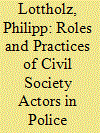

|
|
|
|
|
| Summary/Abstract |
The increasingly complex and differentiated field of security sector and police reform has given rise to extensive research into such processes, but also the stalemate and contradictions they are facing. Recent analyses have shown how civil society actors can successfully influence reform and hold authorities accountable, but are also facing limits in terms of their own expertise, capacity and representativeness. This article presents new evidence of interactions between civil society, state authorities and international organizations on the basis of participatory fieldwork and public discourse analysis in the Kyrgyz Republic in Central Asia. Taking particular interest in practices, expertise and knowledge production, I show how the organization in focus, an NGO network promoting alternative approaches to police reform, had to live up to different roles in trying to effect change: that of activists who mobilize popular support; of experts who apply novel, participatory community security approaches in piloting communities; and lastly, that of knowledge producers providing evidence of the need for reform. These roles and practices, and their implications for the network’s reform impact are critically assessed and, in conclusion, developed into the need for future research.
|
|
|
|
|
|
|
|
|
|
|
|
|
|
|
|
| 17 |
ID:
153259
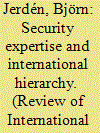

|
|
|
|
|
| Summary/Abstract |
Many states partially relinquish sovereignty in return for physical protection from a more powerful state. Mainstream theory on international hierarchies holds that such decisions are based on rational assessments of the relative qualities of the political order being offered. Such assessments, however, are bound to be contingent, and as such a reflection of the power to shape understandings of reality. Through a study of the remarkably persistent US-led security hierarchy in East Asia, this article puts forward the concept of the ‘epistemic community’ as a general explanation of how such understandings are shaped and, hence, why states accept subordinate positions in international hierarchies. The article conceptualises a transnational and multidisciplinary network of experts on international security – ‘The Asia-Pacific Epistemic Community’ – and demonstrates how it operates to convince East Asian policymakers that the current US-led social order is the best choice for maintaining regional ‘stability’.
|
|
|
|
|
|
|
|
|
|
|
|
|
|
|
|
| 18 |
ID:
133257
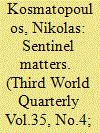

|
|
|
|
|
| Publication |
2014.
|
| Summary/Abstract |
In this article I focus on the crisis experts in Lebanon and, in particular, on one celebrated expert response to crisis, the crisis report. I suggest looking at the report as a techno-political tool that seeks to produce and disseminate knowledge about crisis and conflicts in different parts of the world, while packaged and structured in a universal format. As a first step I analyse the particular features of this format, such as size and scale. The main argument is that the report presents itself as an assemblage of a series of technical characteristics that help to shrink the world and make it fit the model format of the crisis expert. In a second step I open up the perspective and link the report's micro-format to bigger questions on governing the world today. Here, I argue that, within current imaginaries of emergency, impending crisis and global terrorism, the crisis report functions as a particular kind of sentinel. I show that it can speak through the language of constant alertness and, crucially, the production of sentinel subjectivities that must be continuously monitored.
|
|
|
|
|
|
|
|
|
|
|
|
|
|
|
|
| 19 |
ID:
182617
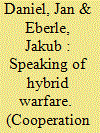

|
|
|
|
|
| Summary/Abstract |
What do we speak of when we speak of ‘hybrid warfare’, a notion that has become prominent in discussions of European security? The article shows that this question is difficult to answer, as the hybrid warfare discourse is not only vague, but also consists of multiple, and at times contradictory, narratives. While talking and writing about supposedly the same thing, participants in the hybrid warfare debate often suggest markedly different ideas about the precise nature and target of the threat, offer different responses and draw upon different expertise. Grounding our argument in critical scholarship on narratives, security knowledge and hybrid warfare, we build a framework for studying security narratives around the four elements of threat, threatened value, response and underlying knowledge. This framework is utilised in a case study of Czechia, a country that has played a pioneering and outsized role in European hybrid warfare debates. We identify three narratives of hybrid warfare – defence, counterinfluence and education – which present markedly different understandings of ‘hybrid warfare’, and ways to defend against it. Our intervention hopes to contribute to disentangling the contradictions of the hybrid warfare discourse, itself a necessary precondition for both sound state policy and an informed public debate.
|
|
|
|
|
|
|
|
|
|
|
|
|
|
|
|
| 20 |
ID:
181636
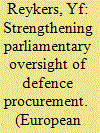

|
|
|
|
|
| Summary/Abstract |
This paper asks: to what extent can a dedicated or special committee with access to classified information empower parliaments to oversee major defence procurement decisions? These decisions often involve a mixture of political, military, economic and societal interests. Particularly after episodes of contestation or controversy, questions tend to arise about how to empower parliaments. The central argument in this paper is that being institutionally empowered and incentivised does not guarantee rigorous oversight. The availability of expertise is an oft-ignored factor in studies of parliamentary oversight. An analysis of oversight behaviour by the Belgian Federal Parliament during the acquisition of new fighter jets (2015–2018) shows that members of parliament also need to be capable of mobilising the necessary expertise in order to translate technical information in such a way that it allows them to influence decision-making, which is often executive-dominated. In this way, this paper contributes to managing expectations about the capacity of parliaments to cope with complex military problems.
|
|
|
|
|
|
|
|
|
|
|
|
|
|
|
|
|
|
|
|
|